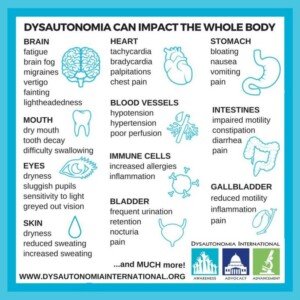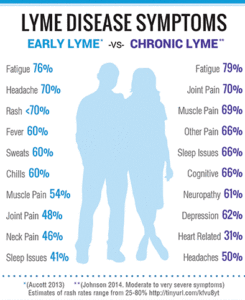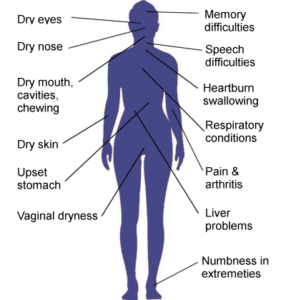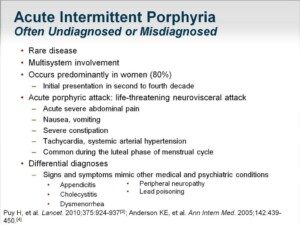This is about diseases that cause the most symptoms at the same time in a single patient.
There are quite a few medical conditions that cause so many symptoms that they can easily be misdiagnosed.
The more symptoms that an illness causes at the same time or within the same relatively short span of time, the more overlap there’ll be with symptom groups of other conditions.
The first disease that may come to mind is metastatic cancer, since metastases can set up real estate in virtually any place of the body.
Metastatic Breast Cancer

Shutterstock/tugol
“Breast cancer can spread to the bones, liver, lung or brain,” says Dr. David Beatty, MD, a retired general practitioner with 30+ years of experience and an instructor of general medicine for 20 years.
Right off the bat, you can see the potential for dozens of possible symptoms occurring at the same time.
“Bone metastasis can cause bone pain or fracture,” says Dr. Beatty.
“Spread to the liver can cause jaundice, nausea, poor appetite and vomiting.
“Lung effects might be cough, breathlessness or pain when breathing.
“If the brain is affected the symptoms will depend on which part of the brain is under pressure. Headache, drowsiness, personality change, seizures or strokes can happen.”
Dysautonomia

Also known as autonomic dysfunction, this condition is when the autonomic nervous system is impaired.
Underactive Thyroid

Hypothyroidism can cause a slew of problems, even though it’s infamous for only three: weight gain, hair loss and sensitivity to cold.
Other Symptoms of Low Thyroid
• Fatigue
• Constipation
• Depression
• Memory problems in older people
• Muscle aches
• Muscle stiffness
• Dry scaly skin
• Brittle nails and hair
• Hoarse voice
• Tingling and numbness in the hands and fingers
• Heavy or irregular periods
• Puffy face
• Joint stiffness or swelling
• Joint pain
• Slow heart rate
Celiac Disease

Shutterstock/iodrakon
One of the most commonly misdiagnosed medical conditions, sufferers can have this for years before finally being properly diagnosed.
In celiac disease, the body recognizes gluten – an ingredient in wheat that finds its way in baked goods, cereals, cookies, crackers and tons of other processed foods – as a foreign invader. The immune system mounts an attack. Over time, this continual state of attack ravages the body.
Symptoms of Celiac Disease
• Abdominal pain
• Bloating
• Gas
• Diarrhea
• Nausea/vomiting
• Weight loss
• Constipation
• Anemia
• Brittle bones
• Itchy skin rash
• Mouth ulcers
• Headache
• Joint pain
• Tingling and numbness in the hands and feet
• Balance problems
• Cognitive impairment
Rheumatoid Arthritis

Shutterstock/Aaron Amat
“Typically it will present with joint pains often involving tendons and muscles,” says Dr. Beatty. “Weight loss, fatigue and malaise can occur.
“Lung effects. It can cause pleurisy, pleural effusion, lung nodules and pulmonary fibrosis. Symptoms of cough, breathlessness and chest pain can occur.
“Hematological. Anemia of chronic disease, bone marrow suppression and hemolytic anemia.
“Platelet count may be too high (giving increased risk of blood clots or dizziness) or too low (causing bleeding).
“White cell count may be low, increasing the risk of infection.
“Lymphoid tissue. Lymph glands can be swollen and the spleen can be enlarged.
“Eyes. Keratoconjunctivitis, episcleritis, scleritis and iritis. Symptoms might be redness or irritation in the eye, eye pain or visual deterioration.
“Heart. Pericarditis, pericardial effusion and myocarditis can cause chest pains, arrhythmias or breathlessness. Nodules in the heart can cause valvular disease or conduction defects.
“Not all of these will occur at the same time, but it is fairly common to have multi-organ disease in severe cases.”
Lyme Disease
Another condition that’s notorious for very delayed diagnosis, Lyme disease is caused by a tick bite.

Lupus

CNX OpenStax, CreativeCommons
This autoimmune disease is when the body attacks its own tissues and can be fatal.
• Face or body rash
• Fever
• Joint pain, swelling and stiffness
• Fatigue
• Skin lesions that appear or worsen in the sun
• Shortness of breath or pain breathing
• Chest pain
• Fingers and toes that turn white or blue during stress or in the cold
• Dry eyes
• Headaches
• Dizziness
• Vision problems
• Stroke
• Seizures
• Memory problems
• Kidney damage
• Anemia
• Blood clots
• Myocarditis
Sjogren’s Syndrome
Most patients with this autoimmune disease are women.
Though the glands that secrete saliva and tears are the first to be attacked, this illness can result in multi-organ fallout and hence, a wide gamut of symptoms, as shown below

Sjogren’s syndrome symptoms
Additional Symptoms of Sjogren’s
• Dry cracked tongue
• Sore throat
• Change in taste and smell
• Mouth sores
• Nausea
• Muscle weakness
• Dizziness
Diabetes

Shutterstock/Ekaterina_Minaeva
You may be familiar with the most publicized symptoms of diabetes: excess urination, excess thirst, excess hunger and weight loss.
“When early onset diabetes first presents, the person can be very ill, particularly if the diagnosis is delayed,” says Dr. Beatty.
“Weakness, drowsiness, abdominal pain, vomiting, blurred vision, bacterial and fungal infections can occur. In more severe cases seizures, coma or shock may be seen.”
It doesn’t end there. “Patients with longstanding diabetes may suffer renal disease, cardiac disorders, peripheral vascular disease, cerebral and other neurological problems.
“Symptoms might include lethargy, chest pain, breathlessness, cold or blue extremities, symptoms of a stroke or loss of feeling.”
Diabetes is also the No. 1 cause of blindness in adults.
Alcoholism

“Alcohol can adversely effect every organ of the body,” says Dr. Beatty of chronic alcoholism.
“Liver cirrhosis can cause jaundice, lethargy, nausea and bleeding disorders.
“Pancreatitis will cause abdominal pain and vomiting, and can be very severe — affecting blood sugar and electrolyte levels.
“Indigestion, peptic ulcers and bleeding into the bowel are more common.
“Cardiac effects may include cardiomyopathy, arrhythmias and blood pressure, and cholesterol can be high.
“Neurological complications can include subarachnoid hemorrhage and dementia.
“Bone marrow suppression leaves the person at risk of severe infections.
“Diabetes, gout, osteoporosis and impotence are all more likely.”
Lymphoma

cancer.gov
Cancer of the lymph nodes can cause the following symptoms.
• Abdominal pain or swelling
• Nausea/vomiting
• Loss of appetite
• Cough
• Trouble breathing
• Chest pain
• Swelling in the arms, upper chest or head
• Headache
• Cognitive problems
• Seizures
• Double vision
• Facial numbness
• Speech problems
• Itching
• Red or purple bumps under the skin
Lymphoma in just one part of the body won’t cause so many symptoms. But if there are multiple tumors all over, the symptom list will be big.
Sarcoidosis

Shutterstock/InesBazdar
“This is another multi-system inflammatory disease,” says Dr. Beatty.
“The cause is unknown. A granuloma can form in various organs, but it most commonly affects the lung.
“Cough and breathlessness are common.
“Swelling of the ankles and a rash on the legs can occur.
“The lymph nodes, liver and spleen can be affected.
“It may also involve the heart, the nervous system and the kidneys.”
Meningococcal Meningitis or Septicemia

Shutterstock/Rocketclips, Inc.
“This is a life threatening illness caused by a bacterial infection,” says Dr. Beatty.
“I would expect symptoms of fever, headache and generalized aches.
“The typical rash is purplish in color and doesn’t disappear when pressed.
“Vomiting, lethargy and neck stiffness can occur.
“The breathing rate and heart rate may be fast.
“Cold extremities may be the harbinger of more severe shock, drowsiness and coma.”
Porphyria
This rare disease refers to a group of disorders resulting from the buildup of natural chemicals in the body that produce porphyrin.
Porphyrins are necessary for the function of hemoglobin, which carries oxygen. But high levels of porphyrins cause serious problems.

What about a brain tumor?
You may be aware that a brain tumor can cause a huge list of symptoms.
But the enormous array of symptoms pertains to all the possible locations of a brain tumor.
Typically, by the time a person is diagnosed with a primary brain tumor, there’s only one present.
The symptoms will be influenced by what body function that area of the brain controls. However, even just one brain tumor can cause a lot of symptoms.
For instance, the rare, pediatric optic nerve glioma can cause:
• Involuntary eye movements
• Vision problems
• Balance problems
• Headache
• Nausea/vomiting
• Memory problems
• Daytime sleepiness
• Loss of appetite
• Growth delay
Metastatic brain tumors, such as from breast cancer or melanoma, have the potential to cause a much greater list of symptoms all at the same time, as there can be several in different parts of the brain.
Obesity

David Holt, CreativeCommons
Like some of the diseases above, obesity causes conditions that can lead to a host of new conditions.
For instance, obesity can cause type 2 diabetes and heart disease, and those two conditions can then branch out into a gigantic symptom repetoire.
Obesity can also lead to gout, sleep apnea, knee and back pain, osteoarthritis, spinal pathology, metabolic syndrome, fatty liver disease, hypertension, blood clots, infertility, gestational diabetes, miscarriage, stroke, gallbladder disease, kidney disease, hiatal hernia, plantar fasciitis, reduced breathing capactity, acid reflux, skin fold rashes and infections, and numerous cancers.
***
Keep in mind that a person can have more than one of these conditions at the same time.
 Dr. Beatty has worked in primary medicine, surgery, accident and emergency, OBGYN, pediatrics and chronic disease management. He is the Doctor of Medicine for Strong Home Gym.
Dr. Beatty has worked in primary medicine, surgery, accident and emergency, OBGYN, pediatrics and chronic disease management. He is the Doctor of Medicine for Strong Home Gym.
 Lorra Garrick has been covering medical, fitness and cybersecurity topics for many years, having written thousands of articles for print magazines and websites, including as a ghostwriter. She’s also a former ACE-certified personal trainer.
Lorra Garrick has been covering medical, fitness and cybersecurity topics for many years, having written thousands of articles for print magazines and websites, including as a ghostwriter. She’s also a former ACE-certified personal trainer.
.









































